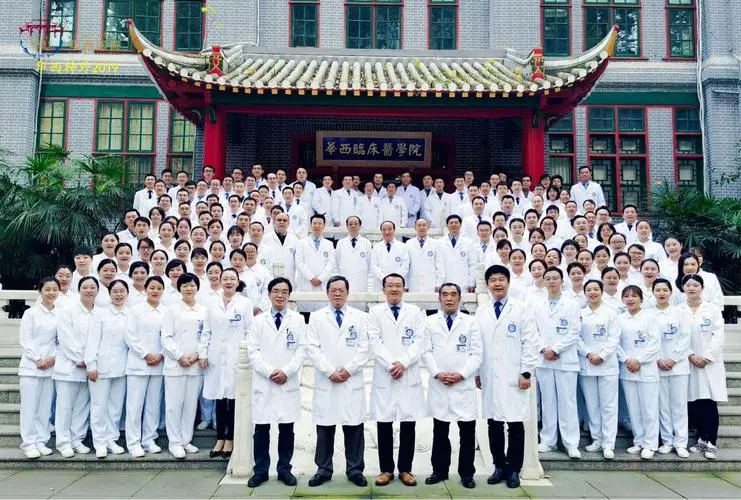Department of Neurosurgery, West China Hospital, Sichuan University
2024-06-26
The team's academic cooperation achievements and documents with the Department of Neurosurgery, West China Hospital, Sichuan University:
Neurosurgery is one of the disciplines with the shortest history and the fastest development in all surgical fields. By the early 20th century, it had a relatively complete system theory. Before liberation, neurosurgery in my country was almost blank.
In the nearly three decades from the founding of New China to before the reform and opening up, a group of neurosurgeons represented by teachers such as Qiu Xiguang, Gao Lida, Liao Wenman, and Qiu Xuxiang from West China Hospital, who were almost isolated from the outside world in the field of science and technology and in an extremely difficult environment, continued to explore and make progress, and did a lot of pioneering work for the development of neurosurgery in West China Hospital and other provinces.
In 2005, West China Neurosurgery completed a major reform in its discipline construction - subdividing subspecialties. At that time, West China Neurosurgery was the only comprehensive and super-large hospital in China that completed the sub-specialty division in the true sense. Since then, West China Neurosurgery has embarked on a path of rapid development. Over the past decade, due to this major move, the department has achieved unprecedented achievements in many aspects of medicine, teaching, research, discipline construction and talent training.
At present, there are 52 doctors in our department, including 15 senior professional titles, 14 associate senior professional titles, 15 intermediate professional titles, and 33 doctoral degree holders. There are 8 doctoral supervisors and 16 master's supervisors in the department. Among them, there are 9 senior professional titles, 4 intermediate professional titles, 3 doctoral supervisors, and 14 doctoral degree holders in Shangjin Campus. West China Neurosurgery is the first batch of doctoral degree (1986) and master's degree (1981) authorization points approved by the State Council. It is also an important neurosurgery doctoral graduate training base and postdoctoral mobile station in western China. The department currently has sufficient talent reserves and a sustainable talent echelon. In recent years, the department has undertaken more than 70 scientific research projects at the national, ministerial, and provincial levels, and published more than 700 papers, including more than 200 SCI papers. More than 20 monographs have been edited and co-edited, and 15 scientific and technological achievement awards at various levels have been won, including 4 national and 8 provincial and ministerial awards, including the first and second prizes of the Chinese Medical Science and Technology Progress Award, and the second prize of the Huaxia Medical Science and Technology Award. We have established long-term cooperative relationships with several foreign medical centers.
At present, neurosurgery is divided into ten sub-specialties, including cerebrospinal vascular diseases, anterior and middle skull base diseases, posterior skull base diseases, gliomas, spinal cord diseases, craniocerebral trauma, functional neurosurgery, stereotactic radioneurosurgery, pediatric neurosurgery, and neurointervention. The department currently has 294 formal beds, including 114 in the Shangjin campus, more than 20 beds in the neuro ICU, and more than 100 beds for rehabilitation and follow-up treatment. It is the largest neurosurgery base in the southwest region. Professional refinement, specialized treatment of special diseases, multidisciplinary joint research, standardized medical and surgical management and other measures have made the department increasingly become the center for the diagnosis and treatment of difficult and severe neurosurgical diseases, and the disease composition has undergone tremendous changes. Complex intracranial vascular diseases, skull base tumors, deep brain lesions, functional neurosurgery, complex craniocervical junction lesions, etc. have become the main treatment, accounting for more than 70% of surgical cases. The hospital is at the advanced domestic level in the areas of craniocerebral trauma, epilepsy surgery, basic and clinical research on craniopharyngioma, surgical treatment of congenital malformations of the atrio-occipital region, and treatment of cerebrovascular disease, Parkinson's disease and other functional neurological diseases.
Medical Overview: The department currently has 294 formal beds, including 114 in the Shangjin campus, more than 20 neuro-ICU beds, more than 100 beds for rehabilitation and follow-up treatment, and has established two-way referrals with many hospitals in Chengdu, with patients coming from all over the country. The annual outpatient volume of neurosurgery is close to 70,000, the annual inpatient volume is more than 10,000, the annual craniotomy volume is 6,799, the annual gamma knife and intravascular interventional operations are more than 2,000, and the total annual operation volume is more than 9,000.
Key disciplines: approved as a key specialty by the Ministry of Health in 2011. 18 people have been appointed to various academic organizations at all levels in China, including vice presidents, vice chairmen, standing committee members, and members of the Chinese Medical Association, the Chinese Medical Doctor Association, and the Neuro-Oncology Committee. More than 20 people have been appointed to various academic organizations in the province, including chairmen, vice chairmen, standing committee members, and members of the provincial and municipal neurosurgery committees. In the "Fudan University China Hospital Best Specialty Reputation Ranking" since 2010 and the "China Best Clinical Discipline Evaluation Ranking (Peking University Edition)" since 2016, West China Neurosurgery has long been ranked third in the country.
Medical Education: West China Neurosurgery is one of the first authorized institutions for doctoral degree (1986) and master's degree (1981) approved by the State Council. It is also an important doctoral training base and postdoctoral mobile station for neurosurgery in western China. Currently, there are 73 graduate students, 37 masters and 36 doctors in our department. In 2016, it became the second continuing education and training center in China to be certified by the World Federation of Neurosurgery (WFNS). So far, there are only three such centers in China. Every year, 2 to 4 interns from all over the world are recruited.
Clinical research: After the sub-specialties were divided in 2005, West China Neurosurgery Department undertook 140 national, ministerial, and provincial research projects with a total funding of 35.69 million yuan. A total of 870 papers were published, including 474 SCI papers. A total of 33 patents were obtained, including 17 invention patents. More than 20 monographs were edited and co-edited, and 15 scientific and technological achievement awards were won at various levels, including 4 national awards and 8 provincial and ministerial awards, including the first and second prizes of the Chinese Medical Science and Technology Progress Award, and the second prize of the Huaxia Medical Science and Technology Award.



